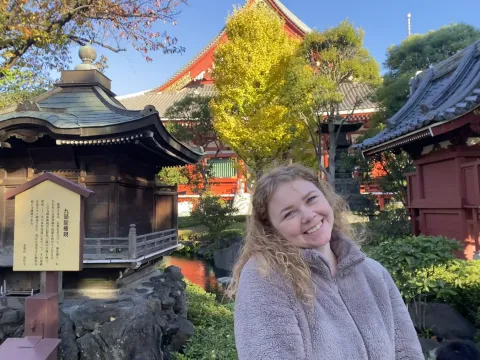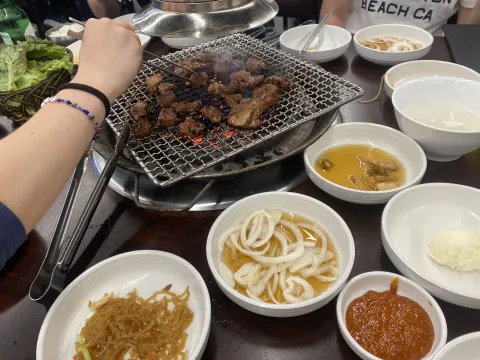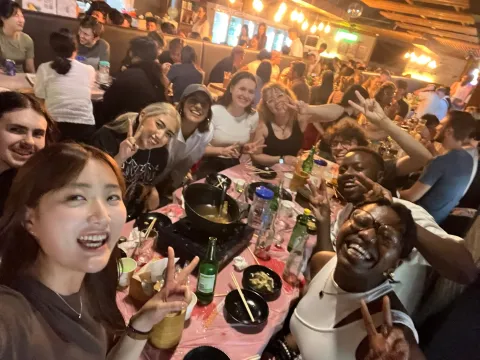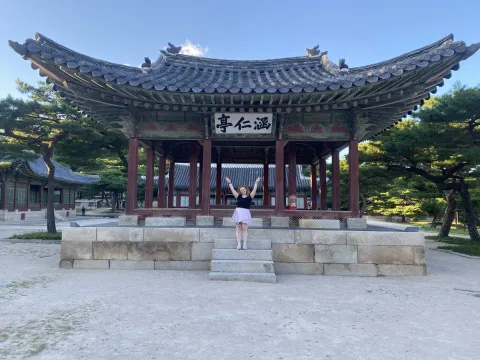Ajou University
Ajou University
Important Information
Semester Dates
- Fall: Late August - late December
- Spring: Late February - late June
Language
- Korean and a variety of English
Website
For further information, visit the International Centre Office (SU060) or email outgoing@uleth.ca
Student Q&A
Did you experience culture shock during your exchange?
Yes
How did you overcome your culture shock?
Connections with other exchange students, especially those from Canada.
What were the biggest cultural differences you experienced?
Language barrier was the biggest, as well as a few social norms like bowing and hierarchy etiquette.
What is the best form of transportation within the city?
Public transport was excellent. Frequent busses run within the city and between cities. We frequently took the bus to Seoul on the weekends. Ajou university gave us public transport cards (T-Money Cards) that can easily be reloaded at any convenient store.
What was your favourite place to visit within the city?
In Suwon, the area around Ajou university was filled with good restaurants and activities like Karaoke, board game cafes, photo booths, and arcades.
Were there any special events, festivals, or holidays in the city you would recommend others attend? Or anywhere you travelled to that you loved?
Ajou university held many different events for students to attend or sometimes participate in. My favorite was the International festival, where the exchange students organized booths that served food and had activities from their home countries. The festival also had a talent show for students to perform; a lot of the performances were traditional to their home countries.
On average, what was the weather like?
In August, IT WAS HOT AND HUMID. I arrived in a crazy heat wave and I was not prepared. After the heat wave, the temperature was mild. From September to November, it was nice autumn weather, not too cold and pretty sunny most days. Comparable to Canada in September, with a little more humidity and more rainy days.
Additional comments about the city?
Overall, Suwon seemed like a perfect location. It was a big enough city with lots of activities, but not crazy busy. It's also close enough to Seoul to make a day trip for events or day trips.
Did you have a favourite course you would recommend to future students?
Strategic Management
Did the university provide airport pickup upon arrival?
Yes
Was there a buddy program?
Yes
Were the following provided in your student dorm?
- Shared kitchen - yes
- Pots, pans, utensils, etc. - no
What furniture was provided in your room?
Bed, desk, closet.
How long did it take to travel from your accommodation to classes?
5-10 minute walk.
Do you have suggestions for future students who are looking for accommodation?
Apply to the dorms as early as possible! Many students did not get into the dorms and I heard private housing can be very hit or miss in terms of space and cleanliness. If possible, spend a little extra money for the International Dormitory. Students in the Hwahong dorm had issues with cleanliness, including mold and cockroaches.
Which company would you recommend students purchase a sim card/e-sim through?
I recommend Airalo e-sim for unlimited data, but you are unable to call or text. A lot of students used Chingu mobile for data, call, text.
Do you have advice for how students should handle banking in your host country?
I was able to use my Visa card for almost all transactions (Debit and Visa-Debit won't work). Carry cash just in case. Some vendors only accept cash transfer- I used the Wise app for this. If you wish to open a bank account, you will need to wait for the ARC card (about 2 months after arrival) and a Korean phone number. However, I managed without.
Please provide any additional suggestions regarding costs.
Food at the dormitory cafeteria is cheap. Wait to buy your return flight until about 2 months before you come home.
What would you suggest students pack before leaving Canada if they are studying at your host university?
Bring enough deodorant and toothpaste for your entire stay. Bring shoes that are comfortable for walking 10k steps a day. Bring an outlet converter and charging block. Pack strategically with you clothes for the hot summer and chilly winter. You probably don't need your Canada-proof winter coat or boots.
Please feel free to add additional comments that you would like to share with future exchange students going to your host institution.
Daiso is the equivalent of a dollar store and is the best place to shop for your dorm, like clothing hangers, pillows, shower caddies, etc.
What were the biggest cultural differences you experienced?
Restaurants - the server doesn't come to you, and rather you call them. At first I felt rude calling for the server.
What is the best form of transportation within the city?
Public; bus and subway
What was your favourite place to visit within the city?
Hwaseong Fortress
Were there any special events, festivals, or holidays in the city you would recommend others attend? Or anywhere you travelled to that you loved?
Seoul has events going on monthly, that you can keep up with just online. I loved Jeju Island, and Seoul/Suwon is full of gorgeous gardens.
On average, what was the weather like?
On arrival it was super hot. 40 degree with humidity. By October it was comfortable 20ish.
Additional comments about the city?
Plenty of places to eat, shop, and lots to experience.
Did you have a favourite course you would recommend to future students?
Industrial Relations
Did the university provide airport pickup?
Yes
Did the university have a buddy program?
Yes
Additional comments about your host university?
Airport pickup was available - but I didn't get picked up. Nice campus, but some of the dorms are older, and some other students did experience problems in the older dorms (mold).
Were the following provided in your student dorm?
- Bedding - yes
- Shared kitchen - yes
- Pots, pans, utensils, etc. - no
How long did it take to travel from your accommodation to classes?
5 minutes
Do you have suggestions for future students who are looking for accommodation?
International dorms are a much better choice than Hwahong Hall. With that said I stayed in Hwahong and never experienced any issues, and saved money that way. The university also provided alternative Airbnb hosts if dorms got full.
How much cash would you recommend students bring when arriving?
30000 won, but I had none and was totally fine.
Which company would you recommend students purchase a sim card/e-sim through?
Ajou recommends Chingu mobile, and I do too - cheap, easy, reliable
Do you have advice for how students should handle banking in your host country?
Students have the option to open a Korean bank account, but it's not necessary if only one semester.
Please provide any additional suggestions regarding costs.
Debit cards don't work. You HAVE to pay with an international credit card (or cash) such as Visa or AMEX.
What would you suggest students pack before leaving Canada if they are studying at your host university?
Bring clothes for variety of weather. It gets super hot, and considerably cold. Bring anything you would need for a normal semester (eg laptop), and only bring essentials. Also STOCK UP ON DEODORANT, it's near impossible to find deodorant if you're not in Seoul
Any additional comments that you would like to share with future students?
Ajou is great, good profs, everything you need is on campus. Don't worry about cooking for yourself, the school cafeteria is cheaper than groceries.
About
South Korea, officially known as the Republic of Korea, lies adjacent to China and Japan. There are about 3,000 islands belonging to South Korea, located mostly off the west and south coasts. The country is often referred to as one of the "Four Asian Tigers" due to its rapid industrialization and economic growth. It is famous for its K-pop music, K-drama television shows, delicious cuisine (including kimchi and bulgogi), and cutting-edge technology companies such as Samsung and LG. With a population of over 50 million people, South Korea is known for its high-quality education system and strong emphasis on innovation and entrepreneurship. Mountain ranges have traditionally served as natural boundary markers between regions, historically inhibiting contact between people living on either side of the range, creating substantial differences in the spoken language and customs of the Korean people.
Suwon is the largest city in the Gyeonggi province, and also the province's capital. Suwon is approximately 30 kilometers south of Seoul. Suwon can be reached from downtown Seoul in under an hour by train, subway or bus.
During the Joseon Dynasty (1392-1910), the city served as one of five fortresses guarding the approach to Seoul. In the late 18th century, King Chongjo made an ultimately unsuccessful attempt to make Suwon the nation's capital with the construction of Hwaseong, a fortress wall running around the entire city. The walls once encircled the entire city, but it has now spread out far beyond the fortress. Suwon is often called the capital of Korean football because of the popularity of the sport in this region. The city is also home to Korean Baseball Organization team the Hyundai Unicorns. It is easy to get around in Suwon due to efficient public transportation system. Many attractions are within a one-hour trip from Suwon, including the Everland Amusement and Water Park complex, the Korean Folk Village, and Seoul.
Ajou University is one of the most dynamic universities in Korea, located in and among the cultural, historical, industrial and recreational resources of Suwon. Since its inception in 1973, Ajou University has been nationally recognized for its excellent programs in Engineering, Medicine, Business, Computer Engineering and International Studies. In these fields of study, Ajou University has been ranked as one of the top schools in the nation in many important surveys and evaluations.
Ajou University and the surrounding communities offer a rich educational and recreational environment with the unique cultural and historic heritage and easy access to the diversity of Seoul. The university provides a cozy academic and residential atmosphere with harmoniously arranged classrooms, laboratories, libraries, residential halls, and recreational and cultural facilities on the main campus, spanning 130 acres with 35 buildings. The immediate area around the university is surrounded by an abundance of restaurants, pubs, and shops.
Cultural Trips and Events
Ajou University offers various free cultural trips for incoming exchange students each semester. These trips may include trips to Jeju Island, Suwon (including Korean Folk Village, and Hwasong Fortress), and Seoul City. Other social activities are also planned each weekend by the Friends Club, who act as buddies to international exchange students. Each November, in celebration of the internationally recognized International Education Week, Ajou University organizes an International Festival, celebrating through dance, social activities, and especially food. Exchange students play a significant role in these events by running their home country's booth, and presenting information about their home institution. During this festival, tents are set up on campus selling beers and snacks. During the spring semester, Ajou University and all other Korean universities hold a Spring Festival. This is also a big event with showcase performances by both celebrities and various campus clubs.
Program Information
Courses in English
Ajou requires exchange students take a minimum of 4 classes per semester. For a list of courses offered in English click here. Course lists are confirmed two months prior to each semester. Students with high Korean Language proficiency may, with permission, select courses offered in Korean.
Language Courses
U of L students are required to complete at least one Korean language course while at Ajou University. Courses can be found on the same list as above.
Other Programs
In addition to its two regular full-length semesters, Ajou University offers a six-week International Summer School program that runs every summer from July-August. Delivered entirely in English, the focus of the program is Korean and Asian Studies; a few business courses are also offered. It includes an intensive Korean language class. Students are matched with friendly Korean buddies; classes are small, and students are taken on cultural field trips.
University of Lethbridge students can earn a maximum of 3 U of L courses (9 credits) for courses taken at Ajou Summer School. Courses can transfer back as Management 3/4XXX, Social Science 1/2XXX, or Humanities 1/2XXX. Each 3-credit Ajou summer course is equated as one 3-credit U of L course. Specific course availability can be viewed on the Ajou University website. The program cost of approximately C$780, including dormitory housing, meals, and cultural trips. Flight, health insurance, and U of L tuition are additional costs.
Colleges that offer courses in English include:
- Engineering
- Computing and Informatics
- Information and Technology
- Natural Sciences
- Business
- Humanities
- Social Sciences
Students at Ajou may take a maximum of 19 credits per semester. Courses at Ajou are typically worth 3 credits, equivalent to one U of L course.
Requirements
You are eligible for this exchange if you are:
- A full-time U of L student
- In at least the 2nd year of your program
- In good academic standing, with a GPA of 2.5 or higher
It is MANDATORY for exchange students to apply for a D-2-6 (exchange student) visa. You can apply for the visa through mail at the Consulate General of the Republic of Korea in Vancouver. The visa application fee is $78 CAD (2023).
Students must also apply for an Alien Registration Card (ARC) within 90 days of their arrival in South Korea.
For more information about applying for a visa, visit the Ajou website or the Vancouver Consulate website.
The Consulate General of the Republic of Korea in Vancouver
Phone: (604) 681-9581
Email: vancouver@mofat.go.kr
Website
For detailed information about vaccination recommendations when visiting South Korea, please visit the Government of Canada's website.
Expenses
- Cost (2023): KRW 178,000-343,000/month (approx. CAD 175-350)
- Exchange students can stay in one of two residence buildings, Hwahong Hall and New International Dorm
- Rooms are furnished either two single beds (double occupancy) or two bunk beds (quadruple occupancy) with dressers, desks, chairs and Wi-Fi. A bed sheet, an air pillow, and a blanket are provided when students move in.
- Kitchens, shower rooms, and washrooms are shared between floors. There is a shared laundry room in the basement of the cafeteria.
- University Dining Service provides students with meal plans at a very low cost. For those not selecting a meal plan, several cafeterias and kitchen facilities are available on campus, or students could frequent the many restaurants close to campus.
Arrival Information
The Ajou University International Office arranges transportation for exchange students from the Incheon International Airport (Seoul); for a shuttle, the cost is approximately C$15. Your arrival form will be required for the complimentary airport pick-up.
In Suwon
Suwon is a regional transportation hub and an important stop on the Gyeongbu railway line going from Seoul to Busan, although the new KTX high-speed train has changed things slightly. Suwon is connected to Seoul with city and express buses and also the Seoul subway network. Suwon is also a stop on Seoul Subway Line 1, which runs from Cheonan in the south all the way to Uijeongbu in the north-east and can be reached from downtown Seoul in under an hour.
Buses are relatively cheap in South Korea. The city has special student fares. Depending on the station where you want to go, it will cost between ₩400-1,500 per ride (approx. C$0.50-$2.00).
Students going on an exchange pay regular U of L tuition and fees. For up-to-date tuition information, visit the U of L's Financial Services website.
It is MANDATORY for students to have health insurance valid in South Korea for their entire period of stay. As well, students are required to purchase the South Korean National Health Insurance. The cost is approximately KRW 50,000/month (approx. CAD 50, 2023). The details on the insurance and insurance exclusion will be explained during the orientation.
All students are required to submit the copy of the insurance contract within the first week of the semester. If a student does not submit a copy of the health insurance, the issuance of documents such as transcripts, Certificate of Enrollment, etc., will be restricted.
|
Airfare |
CAD 2,000 |
return |
|
U of L Tuition |
See Fee Schedule |
|
|
Rent |
CAD 175-350 |
per month |
|
Food |
CAD 2,400 |
per semester |
|
Textbooks |
CAD 400 |
per semester |
|
Transportation |
CAD 0.50-2 |
per bus ride |
|
Visa |
CAD 78 |
|
|
National Health Insurance |
CAD 50 | per month |
Student Photos




